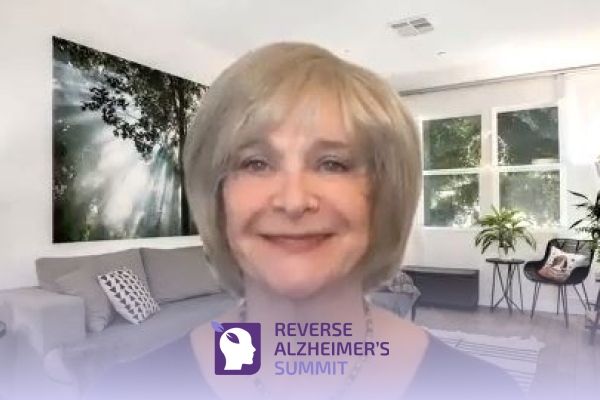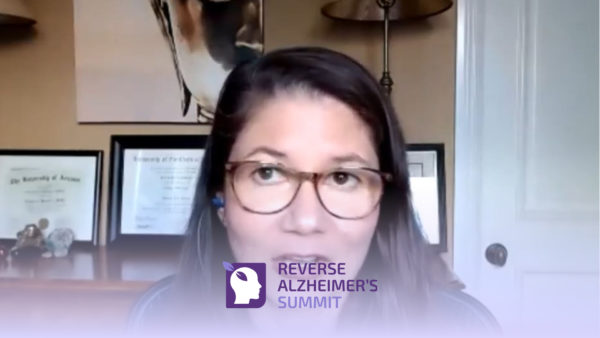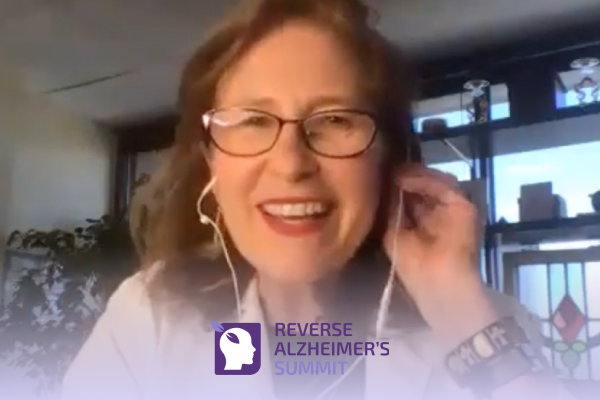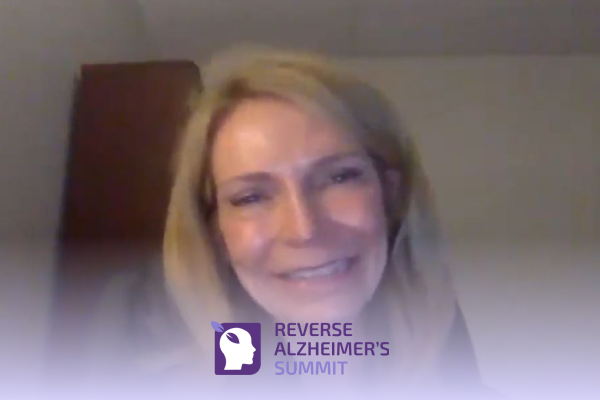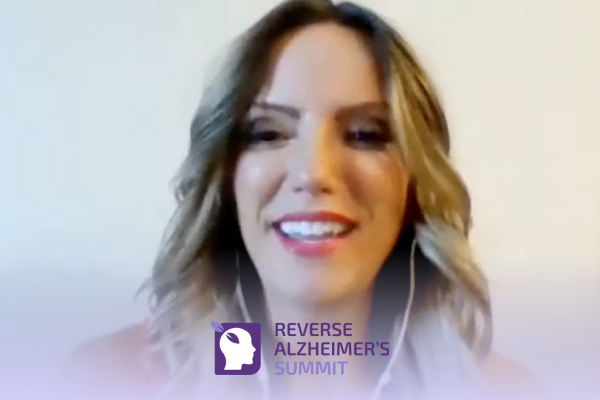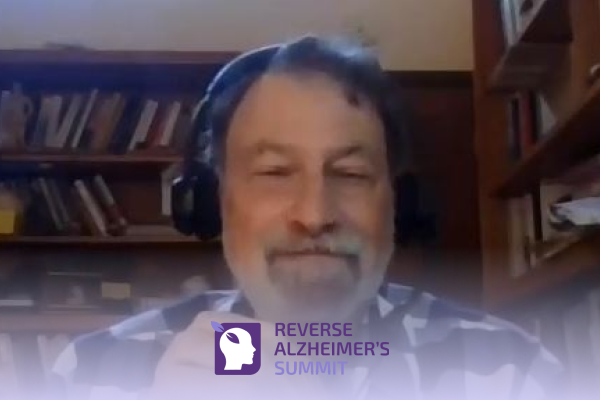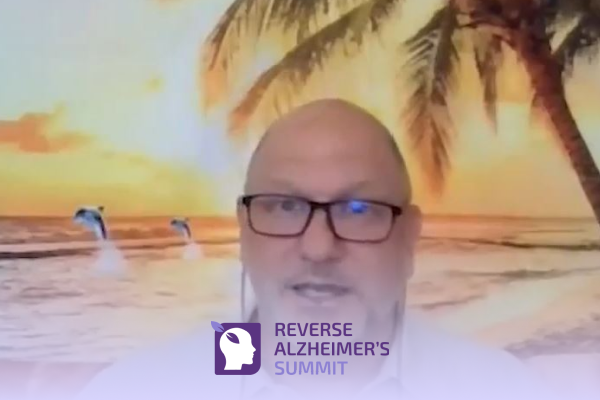Join the discussion below
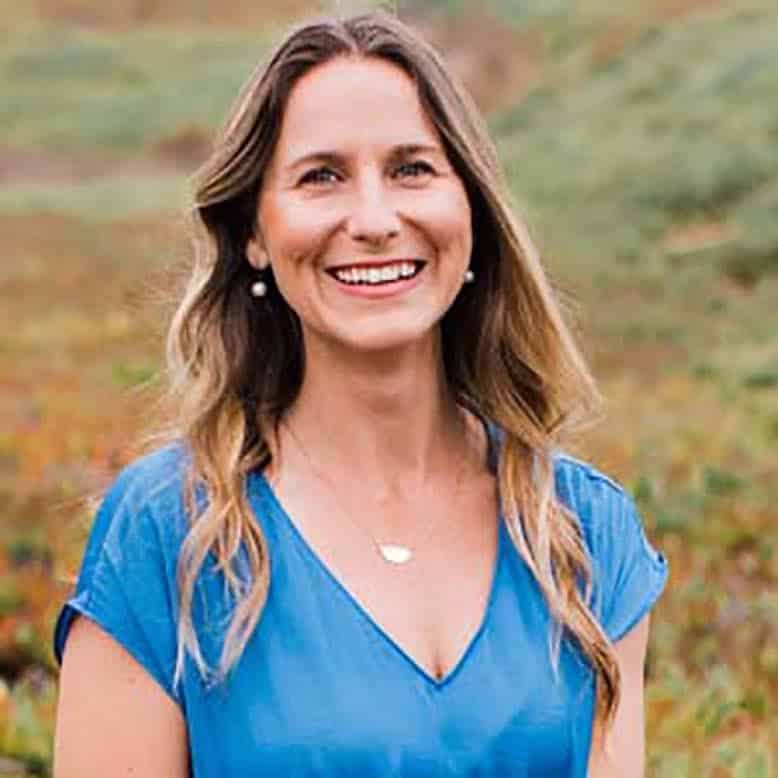
Dr. Heather Sandison is the founder of Solcere Health Clinic and Marama, the first residential care facility for the elderly of its kind. At Solcere, Dr. Sandison and her team of doctors and health coaches focus primarily on supporting patients looking to optimize cognitive function, prevent mental decline, and reverse... Read More
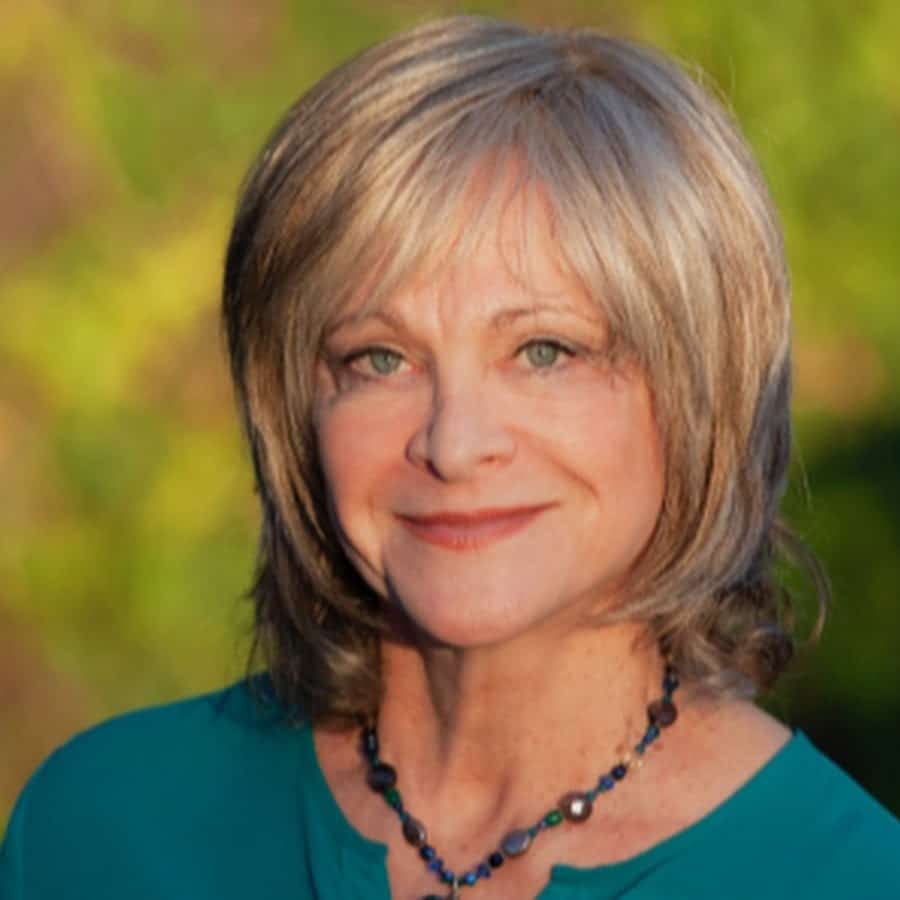
A recognized pioneer in holistic and functional medicine and psychiatry, Dr Hyla Cass is a frequent guest on radio, TV, podcasts, and documentaries. She has written several popular books including Natural Highs and 8 Weeks to Vibrant Health. She helps people enhance their mind, mood, and memory using diet, lifestyle... Read More
Heather Sandison, N.D.
Welcome back to the Reverse Alzheimer’s Summit. I’m your host, Dr. Heather Sandison. I’m so excited to have my dear friend and an expert in the field, Dr. Hyla Cass with us today. She is a recognized pioneer in holistic and functional medicine and psychiatry. Dr. Cass is a frequent guest on radio, TV, podcasts, and documentaries. She’s written several popular books, including “Natural Highs” and “8 Weeks to Vibrant Health”. She helps people enhance their mind, mood and memory using diet lifestyle and targeted nutritional supplements. The latest addition to her toolbox is CBD, which greatly enhances the effects of the other nutrients. And she’s also founded her own line of CBD products. Her website is Cass, C-A-S-S-M-D.com. Thank you so much for joining us today. It’s such a pleasure to have you.
Hyla Cass, M.D.
And it’s such a pleasure to be on the show. This is great. Thank you.
Heather Sandison, N.D.
Well, I just can’t wait to learn more about how you’re using CBD. You know, I look up to you as a mentor in this field and to hear that you found something new and exciting that you see helping people is, I mean, I just can’t wait to dive into it. So how did you discover this was helpful?
Hyla Cass, M.D.
Well, to begin with, I am a functional medicine psychiatrist. So I’m always using nutritional supplements rather than medications and I’m always looking at what’s new. So in terms of dealing with anxiety, depression, withdrawal from meds, addiction, whatever, I’ve always used, amino acids, vitamins, essential fatty acids, you know, the usual. It’s not the usual but it’s usual for me and those of us who practice as we do. And when CBD came along, actually, when it first came along, I said, I’m not really a fan of high dose THC. It’s just not something that ever appealed to me.
So when I first heard of it, I thought it was an excuse to get high and said, oh, I’m not going to deal with that. Then I began to read about it. Then I began to use it on my patients and it was a game changer. It was like, what? This product does so much, you know. It helps obviously it was helping people with addiction and getting off meds. It was shortening the time that it took to do it. And it was treating their original problem which was anxiety depression, which had to do with their neurotransmitter balance and inflammation which is also underlying much of psychiatric conditions. And it has all these properties. And at first I was wondering, as you might wonder, well, is this a panacea, is it hype? Is it placebo effect? What the good news is, it’s not.
It’s that it works on something called the endocannabinoid system. And endocannabinoid system is a balancer. It’s a metabolic balancer and communicator or adaptogenic system which helps all the different systems of the body communicate with each other. The GI system, with the brain, with the hormones, heart, the cardiovascular system, renal system, everything is connected through the endocannabinoid system. So when your endocannabinoid system is low and it’s not functioning properly, then you’re gonna have trouble in some of these areas. And so the good news is that when you bring in CBD and you raise the endocannabinoid system and it becomes more efficient and effective, so many different symptoms will be handled.
Heather Sandison, N.D.
You and I, you know, I think this is what we get most excited about, right? When you stumble across something that, or like you’re always looking for the newest and the best and the research, when you find something that really helps to elevate everything, every cell in the body, every signaling system, when you find something that does that, it’s so exciting. I think the question then becomes, well, does it make you high? Is there a side effect? Is there something that you have to be worried about?
Hyla Cass, M.D.
The getting high effect is from THC. Now, both CBD and THC are derived from cannabis. Cannabis is the parent plant. But then there’s hemp. Hemp has been bred for centuries to be stocky, you know, big stocks, big leaves, and used for the production of paper, cloth and building materials. So it’s a different kind of cannabis, and that is where the CBD comes from. So it has much less THC. And in fact, by legal definition, you can sell it over the counter, if it’s under 0.3% THC content. Over 0.3% THC, then you’re into the marijuana department and you’re dealing with getting it at a dispensary.
Heather Sandison, N.D.
I see. And so where at what percentage would someone expect to feel high?
Hyla Cass, M.D.
That’s a really good question. That 0.3% is not gonna make you high. Usually you need at least five milligrams of THC. So there are compounds that are low THC, that’s considered low THC, five milligrams. So that works synergistically with the CBD and for some conditions it’s preferable. So you wouldn’t go to a dispensary.
Heather Sandison, N.D.
I got it. This idea of synergy is so exciting to me. and certainly it’s what I’ve seen clinically as well, is that CBD tends to enhance the effects of other things. So cacumen is much more anti-inflammatory when it’s mixed with CBD. Pick something off the shelf. And if you add CBD to it, it seems to make it work better. And it’s so nice to hear you validate that. And I’m curious if you know why?
Hyla Cass, M.D.
Well, it’s a potentiator. For example it’s a neuro-transmitters it almost acts the same way as an SSRI which is it blocks the re-uptake. So it blocks the re-uptake of the neuro-transmitter precursor and the neurotransmitter. So the neuro-transmitter will make many more hits onto the receptor. So it hits the receptor and there’s a signal and then it goes back into the synapse and it hits again. And that’s the effect of the CBD.
Heather Sandison, N.D.
And how are people typically consuming this? So is it topical? Is it oral? Particularly in the case of Alzheimer’s, So if anyone is looking to reverse their dementia, I know you mentioned mechanisms like certainly inflammation, neurotransmitters are being affected and so that might help the dementia but if I have either a loved one with dementia or my myself, I’m starting to struggle with cognitive decline, how would I take it? How would I use this?
Hyla Cass, M.D.
Well, I actually use combinations because the tincture, which is the oil, it’s actually an oil, not a tincture, but we call it tinctures in CBD for some reason. But it’s the liquid and droppers and you take a dropper, put it under your tongue and leave it under your tongue for 30 to 60 seconds and it’s absorbed sublingually through the capillaries and it goes into your bloodstream more quickly and your brain is right close by. So it’s gonna go to your brain pretty quickly. On the other hand, you can take a capsule and the capsule has to go through the digestive system and liver, first pass through the liver, and it takes longer to break down and be digested. But then you have it later. So it comes on later and it lasts longer. So I will have people with dementia take… In fact with a lot of conditions, pain as well. You take it under the tongue and at the same time you take a capsule. So you have a one, two punch.
Heather Sandison, N.D.
Got it. Okay. And so that, to be super clear, no one’s talking about something you would smoke or inhale in any way.
Hyla Cass, M.D.
Well, you actually van vape CBD and vaping is not smoking. It’s kept at a controlled temperature where it’s not gonna cause a problem. There were some vapes that came through. Those were THC vapes that had some toxic ingredients. That has not been so for the CBD vapes, but you always wanna know who your manufacturer is and do they use good manufacturing practices?
Heather Sandison, N.D.
You know, this is such a great point. I think that a lot of people don’t realize is that the supplement industry is not particularly well regulated. And so there’s a really big discrepancies maybe we could say or a wide spectrum between people who have high integrity and are creating these products and those who are maybe cutting corners. And there’s not a regulatory agency, that’s doing a great job identifying who’s in which category. So you, you know, kind of a solution this, it sounds like you created your own company. Can you talk a little bit about how you make sure that those products are really high quality?
Hyla Cass, M.D.
Well, to begin with just in general, even aside from mine, I would want to be buying from a company that has a medical person in an important position. A medical director or medical advisor. And it doesn’t have to be a physician, you know? Well, it could be an MD, MDDO, nurse practitioner, but somebody with really good training and can give professional input. I get a little nervous about the big marketers. You know, they found a product, oh, this is hot.
We’re gonna sell a ton of it and they’ll say anything. And by the way, we can’t make disease claims. You know, on my website I absolutely can’t say treats pain, it treats, anxiety, treats, depression, treats dementia, GI problems, Crohn’s disease, PMS, menopause, inflammation. I could go on and on. I can’t say that. So, you know, it’s kind of hard to market something when you can say those things. But when you look at a website that’s making all those claims, you know that they haven’t had their legal… They don’t have a lawyer looking at it. And those are the ones that get letters. They do get letters from the FDA, telling him to cease and desist to pay a fine, to give restitution to their customers. It’s serious.
Heather Sandison, N.D.
Well, it also sounds like if they’re cutting that corner, it makes you wonder what other corners they’re cutting.
Hyla Cass, M.D.
Of course.
Heather Sandison, N.D.
Yeah. Yeah.
Hyla Cass, M.D.
It’s just not a professional approach to things when you’re going against the FDA. The of 1994. and I’m saying that because I was around them and I was part of the group that was trying to get that to change that. They were gonna take supplements off the market, but there was a compromise made with the FDA that as long as we made, or the supplement industry, made structure and function claims but didn’t make disease claims, we were okay. So, people get upset because why does it say on the box what it does? Why can’t you say it? Why can’t you say it? Why don’t you say it on your website? Well, we’re not allowed to. So we have to do it indirectly. And do it in programs like this where I can educate.
Heather Sandison, N.D.
Yeah. Oh, good. So what are the mechanisms that we’re looking at with dementia?
Hyla Cass, M.D.
Well, the same as with anything. It works on the endocannabinoid system. And in the brain we have the CB1 receptors and they’re throughout the body. Actually what we have are endogenous or internal cannabinoids, endocannabinoids that we make, we actually make our own CBD. Anandamide and 2AG are the best known of them. And CBD comes along and it boosts our natural endocannabinoids. It it keeps it going longer. Remember it’s to do with neuro-transmitters lasting longer, the synapse. It does the same with our natural anandamide and 2AG. So it reinforces it. So if you have a low endocannabinoid system, and so you could have inflammation, depression, anxiety, all of those symptoms, any or all, you likely are low in your endocannabinoids so we can reinforce them with Phyto or from plant cannabinoids like CBD. So we’re reinforcing our own natural.
So it’s a very nice dance between nature, external nature, things that are grown, and our nature. And that’s what we’re meant for. We’re meant to have natural solutions and the body runs with it. We have our best pharmacy inside us. It is not CVS and Walgreens, you know. It’s internal. And if we give, if we feed the right things to our body and brain, we get miracles. They look like miracles, but it’s nature. It’s nature at its best doing what it does best.
Heather Sandison, N.D.
Can you talk about any of the miracles that you’ve seen?
Hyla Cass, M.D.
Well, if you want to talk about… I’ve seen them in many different areas. One of them–
Heather Sandison, N.D.
Memory in particular.
Hyla Cass, M.D.
Very interesting. I had a woman 87 year old woman brought to me by her daughter and son-in-law and they were ready to put her in a home because she wasn’t remembering things. She was lethargic. And she came in and they almost didn’t have to bring her in because she didn’t talk. She was just like , had her kind of her head down and she didn’t want, oh, I don’t know. I don’t remember. Just she wasn’t home. And it was really sad to see. And she had been a very vital woman, very smart businesswoman but was failing at this point. So she was also on some medications and I was concerned that the medications were causing the issues. And they were psychiatric medications that I didn’t think she needed.
So I gave them a program for tapering her off of them and added a few supplements, neurotransmitter precursors, some amino acids, some essential fatty acids, omega threes, and CBD. Which I’m gonna call hemp oil extract because it’s more than just CBD. CBD for example, extract also contains other cannabinoids as well as flavonoids and terpenes. So it’s really quite a cocktail. And we call that the entourage effect where they all work synergistically. So I prescribed a hemp oil extract in increasing doses and gradually decreasing doses of the medication. Anyway, they somehow got it wrong .
So it, you know, nothing bad happened, but they took her off the medication over two weeks when I had planned on doing it over a few months. Nonetheless, things happen. That was unusual. But what did happen was she got her brain back. So two weeks later they contact me and say, this is unbelievable. We have her back. She’s remembering things. We’re taking her to restaurants. And she remembers that she’s been there. She remembers what her favorite foods are. She’s able to talk politics, like she always has. And that was in such contrast to the woman I had seen in my office. And I was like, I was very happy. They were, yeah.
Heather Sandison, N.D.
Wow. Yeah, miraculous.
Hyla Cass, M.D.
So that’s miraculous and that continued for quite some time. It did turn out that she had mold in her environment, which is something else I uncovered. So this wasn’t a typical Alzheimer’s, but it was actually due to mold. And so she had to move and treat for mold and so on. and that helped as well but that was down the line. First we had to get her just home–
Heather Sandison, N.D.
And off those medications. So there were kind of two components here. One was, she probably needed to go through a physiologic withdrawal from those medications and it sounds like perhaps the reason they were able to do it so quickly and successfully was because of the addition of probably all of what you gave them. Certainly the amino acids, the fatty acids, and then the CBD.
Hyla Cass, M.D.
Yes and no. What happened was she didn’t wanna take all those pills. She kind of rebelled and they were able to use the tincture and the capsule. And that was, I insisted on that. So she was taking the 25 milligram capsule twice daily and I don’t remember the exact dose of the tincture that she was taking but they built up probably like 50 milligrams a day over the course of a day, maybe 25 and 25 and the capsules at both ends. And so, as I said earlier the tincture gets you go in earlier and then you take the capsules later, but they last longer. So that was a really good success story.
Heather Sandison, N.D.
And so she didn’t have a lot of the amino acids or the fatty acids. she was really getting the CBD primarily as she went through that withdrawal process.
Hyla Cass, M.D.
Yeah. And I’m wondering if it helped with the mold because it helps with brain inflammation. So, you know, and one of the effects, negative effects of mold is to cause brain inflammation.
Heather Sandison, N.D.
Of course. Yeah. We’ve I also see a lot of mold patients clinically and the number one complaint I would say across the board is brain fog or memory lapses, or this kind of fatigue, this brain fatigue, like a lack of motivation, a struggle to find words, very, very similar to what Alzheimer’s and dementia patients feel. Yeah, so how exciting. When you talk about hemp oil, CBD this helps with so many of these underlying causes. So when we address those root causes, does that mean that people end up getting off of this? Or is it something that you typically recommend using long-term?
Hyla Cass, M.D.
Well, what’s really interesting is it actually has a neuroplastic effect. It affects the brain in a way that it starts to heal itself. It develops different pathways. It creates neurogenesis, which means we actually develop new nerve cells. So it’s new nerve cells, new pathways. And after a while, you can actually reduce it. For many people, they’re able to reduce it, some people can come off it and then just take it as needed. It’s really variable and I tell people, you know, it’s very individual. Your dose is individual and so is how long you should be on it. And the good news is people can titrate that themselves.
Heather Sandison, N.D.
Yeah. And probably also great to be working with a provider like you who can coach them through that. Who has some clinical experience who understands some of these mechanisms and can make sure that that’s all done safely.
Hyla Cass, M.D.
Right, Yeah. I’m not practicing clinically now, but I am educating people about the use of CBD.
Heather Sandison, N.D.
Fantastic. And so needed. So I love, we kind of talking about this neurogenesis and the synaptic genesis. It has so much to do with dementia and we must, if we’re having trouble creating new memories, that is absolutely essential to recovery that we meet need to be able to create these new connections, new neurons. We’ve got to be sending those signals to create the, you know, those youthful signals that are associated with good memory, good mood. So dementia is treatable. You’ve seen this in your office. Can you talk a little bit more about what the other root causes are? We’ve mentioned mold and then the addition of CBD and how that can be helpful. What else are you addressing or what else do you coach a newer doctors, newer providers to look for?
Hyla Cass, M.D.
Well, basically there’s so many reasons for brain inflammation, TBI, head injury, mold, any kind of any infection and, you know, you name it, many, many things affect the brain and so we have to do a differential diagnosis and treat whatever issue is underlying that. And by the way, I just wanna mention that many people with dementia also have other things that are going on. Which is they can’t, for example, they have trouble sleeping because their circadian rhythm is really off.
Now, they’re sun downing, they’re up at night, the sleeping during the day. And one of the things that CBD does is it helps to regulate the circadian rhythm. So it gets your rhythm back on track. It also helps with regulating the different stages of sleep. You know, there’s REM sleep, Deep Delta sleep, all these different stages and you wanna have all the stages. So, it’s like it adjusts your internal clock.
Heather Sandison, N.D.
How amazing. And then you also mentioned when we’ve chatted before, it enhances nerve growth factor. Is this one of the ways in which it creates this synaptic genesis and neurogenesis?
Hyla Cass, M.D.
Yeah. It enhances BDNF, which brain derive a nerve growth factor. So it’s very, very good for the brain and the nervous system.
Heather Sandison, N.D.
And then also you mentioned the immune system.
Hyla Cass, M.D.
Yeah. It works peripherally on the immune system. Which is in the periphery and in the gut. And that’s primarily through CB2 receptors and great for immunity. Great for cytokine storm even that it helps to. It’s not gonna adapt to jet. So if your immune system is overreacting as it does in cytokine storm, this will actually mitigate it.
Heather Sandison, N.D.
Or maybe auto-immune diseases as well.
Hyla Cass, M.D.
Right. It helps to modulate whatever your immune system is doing. That is not a healthy arrangement.
Heather Sandison, N.D.
I love that word modulation. And this comes up right in our world and functional medicine of how do we enhance function? So we’re bringing down overactive function, like in the case of auto-immune disease or cytokine storms, but bringing up the good function of the immune system, like in the case of fighting off a cancer or Lyme disease or herpes. Any of these things that can go to the brain and cause dementia. So again, like CBD, as I’m learning from you has so many applications in so many of the different root causes that show up with Alzheimer’s.
Hyla Cass, M.D.
And it has effect on hormones. And we know that hormones affect the brain. You know, women who, who are menopausal, who are low in estrogen, have a decreasing brain function. And when they add exogenous estrogen, they start taking the estrogen it enhances their brain function. And CBD affects your hormones in a positive way. It helps them work more effectively.
Heather Sandison, N.D.
Gosh, is there any reason everyone shouldn’t be taking it?
Hyla Cass, M.D.
Good point, you know, some people, well, I don’t really need it. There’s nothing wrong. Then they’ll take it and they’ll say, oh, that’s funny I had this knee pain and I just sort of thought, well, that’s just how it is. You know, a sports injury, blah, blah. And the pain goes away. They’re oh, that’s… Or they’re taking it, let’s say a woman is taking it for PMS and she notices that it helps with headaches. It actually helps with migraines as well, which is quite remarkable because wow, that’s a tough one to treat. And I’ve had people take it. You can take fairly high doses but it works. It doesn’t work a hundred percent, doesn’t work for everyone but it works for a lot of people that have found no relief from anything else.
Heather Sandison, N.D.
How incredible. That’s wonderful. So where can people find out more about getting those really high quality CBD products.
Hyla Cass, M.D.
You wanna have a certificate of analysis available Which means it’s been third-party tested, that the product is sent away to an independent lab that says what’s supposed to be in it is in it. So you get a complete analysis of the content. Another other issue is you want it take organically grown because hemp is a concentrator, which means any kind of junk that’s in the soil is gonna be concentrated into the hemp. By the way, kale is also a concentrator.
So people eating a lot of healthy kale, unless you’re sure where it’s grown and it’s really organic, that’s my little aside for the day here. But hemp is a concentrator in that sense of this pesticides, herbicides, heavy metals residue from past growing or for whatever reason, it’s going to be concentrated into the hemp plant and you’re gonna be ingesting it unless you get something that’s organically grown, where you can rely on it’s being organically grown. They don’t just say it, that it really is.
Heather Sandison, N.D.
And I think a patient brought up to me that I hadn’t really thought about recently was well with all these herbs, not only do they need to be organically grown, but then organically processed, right? Because even after harvesting, you know, it’s been grown, now it’s being processed and harvested, in that process there is risk of mold growing. So are they putting fungicides on it at that point? Or what are they doing in the processing where they could be adding additional chemicals or even additives into the capsule or into the tincture or the oil. So having that entire process maintain that integrity is so important as well.
Hyla Cass, M.D.
And then that’s where you’d have to trust your manufacturer. I mean, we use CO2 extraction so that doesn’t use chemicals. It’s the most natural form of extraction and the more expensive but you know that you’re not adding anything. And in fact, that’s why I like the full spectrum as with THC, because you don’t have to pull out the THC, which is an alcohol process.
Then you have to pull out the alcohol. So better to get the full spectrum which is the most natural form. and that amount of THC in it, 0.3% , is not gonna make you high, but it may have a little bit of a beneficial effect. The only downside to the full spectrum is for people who cannot, because of their job, show a positive drug test. And because THC, even in those tiny amounts can actually accumulate in the fat cells and can actually show up and people are totally surprised, but it’ll show up in a urine test. So for those people, it’s probably best to take the isolate.
Heather Sandison, N.D.
Okay. So this would be like the hemp plant is being processed to take the THC out as well or is this probably more likely like a different sort of, marijuana type cannabis where they’re separating the THC and the CBD?
Hyla Cass, M.D.
Well, I’m not talking about our plants. The plants that come from our local farms, they’re grown and the heartland of America near Chicago and they they’re taking right… It’s a very short distance from the farms taken right to the processing plant and processed. So they don’t hang around in warehouses and get moldy. I mean, they’re harvested, they’re bright in, they’re extracted by CO2 extraction. And when you extract it the first time, what you’re getting is the full spectrum.
You’re getting everything. When you start to take out the THC, even though it’s a really tiny amount, you may have collateral damage. You may actually pull out some of the other good goodies and you’re introducing chemicals of necessity. So although I started out just having a non THC product, we’ve really discovered all this. And it’s an evolutionary process here. I learn as I go and as I learn I change how I do things. So now I’ve introduced a THC line, which I actually really like. It’s really popular.
Heather Sandison, N.D.
How exciting. And yes, you know, it is such a thrilling time to be in this world because we are learning so much more, especially as there are more and more… There’s FDA approval, there’s more states that are opening up access. And as things shift away from it just being considered a drug, to it being considered more a medicine and as understanding the nuances of the different cannabinoids, there is so much just to learn and to grow on and to add to our toolbox.
Hyla Cass, M.D.
Absolutely.
Heather Sandison, N.D.
One of the diagnoses that is CBD and also the ketogenic diet was they was heavily popularized for in research was epilepsy. And now we’re kind of seeing that the ketogenic diet, as well as CBD is very helpful for dementias. And there must be some sort of overlap. Epilepsy is sort of almost like a neurodegenerative process or there is a neurodegenerative process behind it. And so it’s sort of fascinating to watch these interventions work across different diagnoses.
Hyla Cass, M.D.
Absolutely. And also for neurodegenerative disease, everything I’m saying is research-based, you know? This is all there. Thousands of papers. And so anyone who says there’s no research just has an opened a peer review journal lately, you know? it’s right there. So Parkinson’s, MS. ALS, there’s been research in all of them and it’s very helpful in all of them.
Heather Sandison, N.D.
And I feel it… That’s why I’m hosting the summit, right? Because we, you and I see it every day that memory can be restored, that we can reverse cognitive decline. And yet still, so many people are going to their neurologist, even afraid to mention that they’re having struggles with their memory because they’re worried that there’s nothing that can be done.
Hyla Cass, M.D.
Yeah. And they’re put on the usual drugs, you know, for dementia that don’t really work very well. You know, it’s the usual thing it’s like antidepressants. They don’t really work very well and you’re much better off using nature’s pharmacy. Now that doesn’t mean by the way, if anybody’s listening and they’re on an anti-depressant or an anti-anxiety medication, please don’t go off it all of a sudden, you really need to have a discussion with your doctor and taper off slowly.
Many doctors don’t know how to do this. And you know, they’re really good. They’re taught how to put people on drugs, they are not taught how to take them off properly. And sometimes they’ll take them off precipitously and then the person goes into heavy withdrawal and they’re miserable, terrible, terrible symptoms. And the doctor says, see, you really needed it. No, your brain changed. Your brain was changed by the meds. So when you take the medication away, the brain is totally lopsided and shows up with a lot of symptoms. But if you do it gradually with the help, so there’s two sides to it. It’s like you need to go slow and you need to support with nutritional supplements. And if you do that and then add in CBD in the process, you have a really quick and much easier, safer, effective tapering process.
Heather Sandison, N.D.
We see this with acetylcholine esterase inhibitors as well. We’ve had a couple of patients come to Marrama really excited to get off of Namenda or one of the other medications commonly used for dementia. And what happens is we get quick decline if they are doing that without the support of a doctor like you or I where they get the nutritional supplements and they go really slowly and they’re kind of braced to know what to expect.
Like, okay, that’s a little quick because we’re noticing cognitive decline and I couldn’t agree more that it’s so important to make sure you’re working with a well-trained provider if you are going to get off any of these medications that are affecting these neuro-transmitters because absolutely your brain is changing and we need to be able to support that process.
Hyla Cass, M.D.
Right. I’m so glad you were there doing your work.
Heather Sandison, N.D.
Oh, thank you. I am so deeply grateful for the opportunity to do it. It’s so incredible to see people get their brains back. As you mentioned with your patient, you know, just watching someone, it’s almost like a plant that hasn’t been watered, watching them perk back up and come back into a world of awareness is worth dedicating my life to that’s for sure. Dr. Cass, it has been an absolute pleasure to have you here. I am so grateful to you. That you were doing the work to get CBD out to the people who can use it, who might be suffering with pain, dementia, depression, anxiety, unnecessarily. So thank you for doing the work that you are doing. And it’s been an absolute pleasure having you here.
Hyla Cass, M.D.
Well, likewise, the pleasure is mine. And by the way, I have a gift for your listeners.
Heather Sandison, N.D.
Fantastic.
Hyla Cass, M.D.
And it’s a discount on their first order of my hemp oil extract using the code DR H10 which stands for Dr. Heather, 10% off. So you’ll put that in your show notes.
Heather Sandison, N.D.
Absolutely. That’ll be in the show notes, there will be a link. So that’ll be quick and easy for everyone. And I’m excited for everyone to get the benefit of your hemp oil extract.
Hyla Cass, M.D.
Thank you. And thanks for having me just so appreciate it. I appreciate your work. I appreciate you. Thank you.
Heather Sandison, N.D.
Right back at ya.
Downloads

